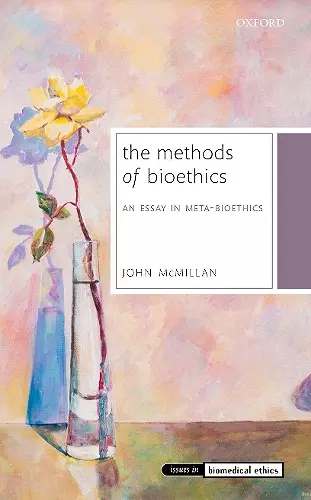The Methods of Bioethics
An Essay in Meta-Bioethics
Format:Hardback
Publisher:Oxford University Press
Published:20th Dec '18
Currently unavailable, and unfortunately no date known when it will be back

This book offers a fresh perspective on bioethics, advocating for a unified approach that emphasizes moral reasoning over fragmented methodologies.
In The Methods of Bioethics, John McMillan offers a comprehensive exploration of the fundamental principles that underpin effective bioethical practice. He identifies crucial methodological challenges that have historically hindered the field, emphasizing the need for a cohesive approach to bioethics. By addressing the fragmentation caused by competing philosophical, sociological, and empirical claims, McMillan advocates for a unified methodology that prioritizes moral reasoning in ethical discussions. This approach aims to illuminate the common ground shared by diverse bioethical perspectives, steering practitioners away from unproductive disputes and towards meaningful dialogue.
The author meticulously outlines how traditional methods in bioethics have often led to excessive theorizing and a lack of practical application. He argues that the field has suffered from an overemphasis on disciplinary boundaries, which can mislead newcomers and result in confusion. McMillan's insights encourage readers to focus on the essence of bioethics: the application of moral reasoning to real-world ethical dilemmas. He posits that a more empirical, Socratic approach can effectively bridge the gap between theory and practice, providing a framework that is both rigorous and adaptable.
Ultimately, The Methods of Bioethics serves as a crucial resource for bioethicists seeking to refine their practice. By clarifying the nature of bioethics and proposing a method that integrates various perspectives, McMillan contributes to a more coherent understanding of how moral reasoning can be effectively applied to ethical issues in healthcare and beyond.
I hope that this book becomes required reading for all students writing essays in bioethics, at the very least at postgraduate level. It should help to dispel the current confusion between the normative and descriptive aspects of the discipline. * Alastair Campbell, Institute of Medical Ethics, UK *
The quality of the writing is high, and the coverage is broad and appropriate. Each chapter is clear and stands on its own feet, so that using the book will be straightforward. The accessibility of the writing is high, so that it is suitable for advanced students, but the arguments are presented clearly and robustly enough to interest the working scholar in the field. * Angus Dawson, Director of Sydney Health Ethics, University of Sydney *
It is really surprising that there is so little written on the methodology of bioethics from the perspective of philosophical bioethics. This book will be central to all future discussion of these issues * Richard Ashcroft, Professor of Bioethics, Queen Mary University of London *
This book can also be used to connect students of philosophy with students of medicine, law, sociology and history, with the aim of jointly exploring problematic practical situations. Thus, I highly recommend it to anyone who is interested in learning more and/or teach about the methodologies of bioethics. * Iva Martonić, European Journal of Analytic Philosophy *
McMillan's analysis of bioethics will serve best as a solid foundation for advanced bioethical inquiry. * W. Simkulet, CHOICE *
McMillan presents an innovative, historically aware, and zeitgeist-capturing manifesto for contemporary bioethics ... Overall, this book serves not only as a fresh foundation on which bioethicists from all disciplines can build, but as a provocative challenge to traditional theory-laden ways of "doing bioethics." * Jonathan Lewis, The American Journal of Bioethics *
ISBN: 9780199603756
Dimensions: 224mm x 147mm x 18mm
Weight: 368g
198 pages